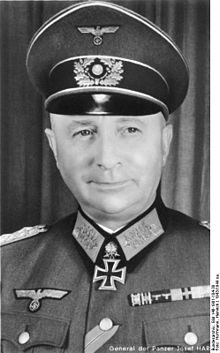Josef Harpe was born on 21 September 1887 in Buer, Westphalia. A cavalry officer and veteran of extensive combat in the Great War, he earned both classes of the Iron Cross by September 1915. After the war, he remained in the Army and rose steadily, but not spectacularly, through the ranks. From 1934 to mid-1939, he commanded Panzer Regiment 3, and assumed command of the 1st Panzer Brigade, 1st Panzer Division in July of that year. In this capacity, he participated in the invasion of Poland, but was transferred to command the Panzer Training School at Wünsdorf in February 1940 and promoted to Generalmajor.
In October 1940, Harpe assumed command of the new 12th Panzer Division, and led it into action as part of Army Group Center’s 3d Panzer Group during Operation BARBAROSSA. AS such, Harpe’s division took part in the great encirclements of Soviet forces around Minsk and Smolensk; Harpe was awarded the Knight’s Cross for his actions in the USSR in August 1941.
Harpe and his 12th Panzer were transferred to Army Group North in November 1941, and took part in the assault on the Leningrad defenses. The division suffered heavy casualties, but Harpe was promoted to Generalleutnant and assigned to command XLI Panzer Corps, which took part in the defensive fighting around Kalinin against elements of Konev’s Kalinin Front. For this, Harpe received the Oakleaves to the Knight’s Cross. Later, XLI Corps was redesignated “Panzer Corps Harpe” and participated in Operation BLAU in roughly the same area around Kalinin. Harpe continued in command throughout the remainder of 1942 and most of 1943, as the tide turned against the German army on the Eastern Front. He was promoted to General der Panzertruppen in the summer of 1942.
Awarded the Swords to his Knight’s Cross in the late summer of 1943, Harpe succeeded Model in command of the 9th Army in Kluge’s Army Group Center in November. During this time, Harpe skillfully directed his army’s defensive and delay operations through the Pripet Marshes. Promoted to Generaloberst in April 1944, he was assigned to command 4th Panzer Army in June. Struck shortly thereafter by the Soviets’ massive Operation BAGRATION offensive, Harpe and his army with-drew into Poland.
In September 1944, Harpe was assigned to command Army Group A, which was attempting to defend a sector of over 300 kilometers’ width with three seriously weakened armies against Konev’s entire 1st Ukrainian Front and part of Rokossovsky’s 1st Belorussian Front. Displeased with his performance in this hopeless situation, Hitler replaced him in January 1945; Harpe was assigned to the nebulous “Leader Reserve,” without a job. He was succeeded by Schörner, a commander known for his ruthlessness and absolute obedience to Hitler.
In March 1945, Harpe was assigned to command 5th Panzer Army during the final days before and during the battle of the Ruhr Pocket. He and his men were captured there by the Americans in April.
Harpe was never at all interested in political intrigue, and owed his rapid rise in rank to professional competence. Never a favorite of Hitler, his tactical acumen nevertheless made him indispensable in the brutal, high tempo fighting on the Eastern Front. He passed away on 14 March 1968 in Nuremberg.
